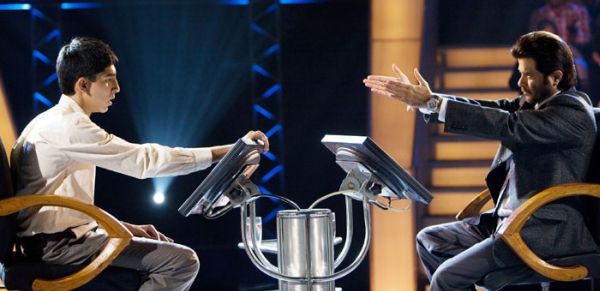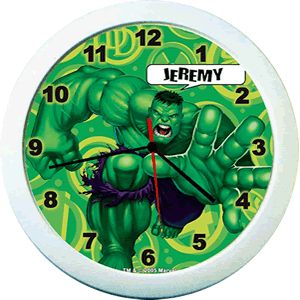
Sorry chaiwalah, that's all the time we have!
Here’s something I’ve noticed: when a movie clocks in at precisely 120 minutes, like Slumdog Millionaire, there’s probably a reason. Sure enough, I found an interview with Danny Boyle in which he says, “We had to cut to get the film down to exactly 2 hours.”
This is not uncommon. Hollywood has become convinced over the years that two hours is the point of diminishing returns. Longer than that, production costs go up, theaters can squeeze in fewer showings, and audiences start to shy away. So studios often insist that directors pare their movies down, no matter what.
David Lynch’s first cut of Blue Velvet was over four hours. The finished product was exactly one frame under two hours (the poor guy had the same two hour limit for the Twin Peaks movie). The director John Sayles actually encouraged his actors to speak faster in Eight Men Out, so he could squeeze the story into 120 minutes.

Hulk SMASH puny two hour running time!! Also Jeremy, apparently!!
Writer/director Richard Kelley publicly complained that Donnie Darko had been “compromised” in trying to make it less than two hours long. Edward Norton did more than complain – when Marvel insisted on cutting The Incredible Hulk down to the magic two hour mark, he refused to do any publicity for the film beyond the bare minimum. (Boyle himself actually dealt with a two hour limit once before, with The Beach.)
And some of the greatest films ever made narrowly escaped being chopped down to two hours. MGM wanted 15 minutes taken out of North By Northwest to get it down to 120 minutes. (Luckily, Hitchcock had final cut.) And believe it or not, New Line had a clause in Peter Jackson’s contract which gave them the right to demand a two hour cut of Fellowship of the Ring. In an astounding case of a studio making the right decision, they let Jackson go way way way longer than that.
So what Slumdog scenes got left on the cutting room floor? Well, Boyle says:
There’s some wonderful stuff with the show host going to the police station and the police commissioner who’s very funny, but it was just confusing and too long, so I just cut it…
We did have an extra question, actually. We cut it for many reasons. One was for length. The other was because it was slightly confusing. You’ll have to watch the DVD to see it. It was a question about a British architect, Frederick Stevens, and what monument in India did he build. The options were: Taj Mahal, Howrah Bridge, India Gate or VT Station. That’s why at the end of the film, Jamal rather bizarrely sat on the statue of that British architect.
Of course, necessity is the mother of invention, and it’s totally possible that Slumdog is a better movie at 120 minutes than it would have been at 140. When Peter Jackson made King Kong, he was so determined not to cut a single thing that he put up $32 million of his own money. And even though I really like the movie, I thought it didn’t have to be 188 minutes. Sometimes, having to think long and hard about what to cut is a good thing.

Peter Jackson’s King Kong should have been shorter by a solid hour. I worry that Jackson might be suffering from the early stages of George Lucas disease…
Stokes, what’s “George Lucas Disease” precisely? Is it just an editing thing, or is it also about selling out a franchise? Just to get it out there, I don’t think the editing Lucas does is bad, so much as the very scripts he works with (“Only Siths speak in absolutes!” for example) and his total inability to come up with anything new (I’m waiting for some sort of animated series based on Luke’s training days with Yoda).
About PJ- The main complaint I heard (and still hear) about the LotR movies from non-Tolkien fans or nerds of a different color is the length- stuff along the lines of, “It was good, yeah, but soooo long.” When “King Kong” came out, a number of them postulated to me that maybe Jackson just doesn’t know how or refuses to edit efficiently. As a LotR fan, it’s hard for me to make that distinction between the trilogy and the remake, since I’m willing to sit and watch all of the extended versions of LotR in a row, but I wanted to get up and leave after the first hour-and-a-half (not even two hours) of “King Kong.” But I see the merit and basis of the argument, and it makes sense. So I’m curious as to *why* you, Belinkie, Stokes, et. al. think PJ’s movies are so long.
LOTR was long because the story demanded it. I understand people grumbling about the length, but anything you removed from it would make it worse. I’m talking about the theatrical release here, though. The extended edition… well, by and large it was an improvement. LOTR was an amazing film, and the extra footage was also amazing, although you can usually tell why it was cut. Not everything long is bad.
But not everything long is good. Watching King Kong, I worry that Jackson has let the overwhelming success (financial AND aesthetic) of LOTR go to his head. The fact that he had to shell out his own money for Kong tells me that, at some point, a studio flack took Jackson aside and told him “Look, these scenes here should be cut.” And Jackson ignored it. He thought he knew better.
That’s George Lucas disease: the belief that everything you make is good, no matter what anyone else is telling you, no matter how overwhelming the evidence that you’re wrong. It’s not about editing necessarily: the problem with The Phantom Menace isn’t it’s length, it’s that it was even made. But movies/books/double-CD-albums that are overlong by a solid %30 are the most frequently observed symptom.
I don’t know how bad Jackson has it, though… King Kong was a pet project of his, a script he’d been working on for years and years. It’s possible that when people told him it was too long, he listened to them, but eventually said “Look, I’m making this one for *me*.” In other words, that he treated it like a vanity project. George Lucas syndrome, then, is when your entire creative output becomes a vanity project.
Stokes, I must disagree about the story “demanding it” for LotR, from a purely objective, non-fan pov. Yes, a Tolkien purist would say every element had to be there, but lots of other books get developed into movies all the time and don’t run three hours long in the theater cut. The fifth _Harry Potter_ book was the longest to date when it was released, and it ended up being the shortest movie- and sure, the Harry purist in me was kind of ticked that some of the cool stuff I liked was taken out or very changed/barely alluded to, but the film-goer in me thought it was a great movie and liked it for what it was. I guess what I’m saying (I’m trying not to sound like a troll/orc/whatevs) is that, at least with film versions of books (or graphic novels or anything else already done on paper, while we’re at it), it depends on 1)how much is absolutely essential and unchangeable for the plot, and 2)how what does get included is modified for the screen- and if it’s adapted well enough, the screenwriter(s) can make it shorter and still have it be of high quality, even if very different from the original text. I guess it comes down to how “true to the text” the film version ends up being.
But I like what you spell George Lucas Syndrome out to be. Can a film company suffer from it, or does it have to be an individual director/producer/whatever? I mean, the pushing for _Spiderman 4_ by the execs at Columbia, even though the actors were extremely against it at first, makes me think Sam Raimi isn’t the only one with a complex involved there…
The Lord of the Rings and Harry Potter have different literary aspirations and target demographics. That’s what accounts for the difference, not a difference in the philosophy of interpretation.
Also, Columbia, which is owned by a large, multi-national conglomerate (Sony), is not pushing for a fourth Spider Man movie because they expect it to be good.
As to the post itself: I take issue with the idea that well-known directors–or even just ones with good credits–are uniformly geniuses and expert craftsmen who flourish artistically in an environment free of the constraints of their employers or the market. “George Lucas Disease” sums the problem with this proposition up pretty well.
Wrather: By “literary aspirations,” do you mean how “faithful” to the books the different production teams wanted to be? If so, I can see why one would desire separate the two book/film series; but I’d still argue that this sort of proves my point that length in an adaptation depends a great deal on how much is included from the source material and how similar or dissimilar that depiction is. Now, that adherence to the original can and probably IS directly related to the goal of the movie (are they trying to make a page-by-page visual, which would most likely mean a longer film, or are they going for the gist of the chapter, enabling a shorter film?); but that doesn’t mean it has to be exact to be good, OR off to be bad (since not everything translates well to the screen and not every addition made up by screenwriters is a poor one). Anyhoo, we can agree to disagree (although I’m not sure how much disagreement there is… seems more like different angles, I dunno…).
And I do agree about Columbia/Sony not caring about _Spiderman 4_ being good, so I guess perhaps I’m confusing “vanity project” with “shameless attempt at profit” in my evaluations of it/them, as well as directors and such in general (since I find it hard to swallow that Lucas’s “vanity” has nothing to do with earning $$$- sure there’s ego, but why commercialize it so much if it’s about making it “for me”?).
Anything over two hours, forget it. I may as well make an appointment with my orthodontist.